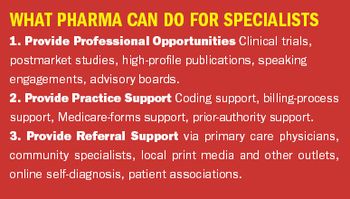
Pharmaceutical Executive
It's not FDA's job to make doctors and patients take more responsibility for using drugs wisely. But whose job is it? Really, whose?

Pharmaceutical Executive
It's not FDA's job to make doctors and patients take more responsibility for using drugs wisely. But whose job is it? Really, whose?

Pharmaceutical Executive
While the most sought-after opinion leaders are often older, well-established physicians, companies should also be aware of the rising stars. Younger, up-and-coming specialists who are beginning to publish are often more cutting-edge and open to experimental approaches.

Pharmaceutical Executive
Cell Genesys knows something about building successful biotech companies. In fact, its chairman and CEO, Stephen Sherwin, MD, a Genentech alum, has built at least three, if you count Cell Genesys spinouts Abgenix and Ceregene. Through a strategy of M&A and licensing programs-plus betting on the right technology at the right time-Cell Genesys has been able to raise enough capital to gamble on what Sherwin believes could be the future's most promising therapies, including gene activation, immunotherapy, and oncolytic virus therapy.

Pharmaceutical Executive
It was like the end of the arms race last November when Pfizer announced it was slashing its national sales force by 20 percent. Coolly downplayed as cost-cutting by new CEO Jeffrey Kindler, the stunning move was met by industry insiders, Wall Street analysts, and the media with one humongous collective sigh of relief. Big Pharma was seen as having grown dangerously addicted to the detailing game over the past decade, with the top firms plowing more and more of their blockbuster profits into trying to keep up with Pfizer's "flood the zone" strategy and with less and less to show for it.

Pharmaceutical Executive
The danger is that effectiveness studies could be used to limit coverage to low-cost products and that additional research requirements for sponsors could be costly

Pharmaceutical Executive
With fewer feet on the street because of downsizing at many drug firms, sales reps and managers need to work smarter-and that means working with information that's both accurate and up to date

Pharmaceutical Executive
Stakeholders worry that less competition among drug suppliers in the United Kingdom could mean higher prices and a bigger bill for the National Health Service

Pharmaceutical Executive
Advertorials were shown to be more effective than branded ads in terms of generating interest, providing valuable info, and provoking follow-up discussions

Pharmaceutical Executive
There's tremendous opportunity for us to understand how drugs can be used even better to get the right outcome, not only how to contain them in order to avoid complications or adverse events

Pharmaceutical Executive
Compliance requires overcoming cultural barriers. To start with, in some countries the taboo against bribery is not as strong as it is here.

Pharmaceutical Executive
The key to becoming a stronghold: Avoid an overfocus on your own business-and never stop being paranoid and opportunistic